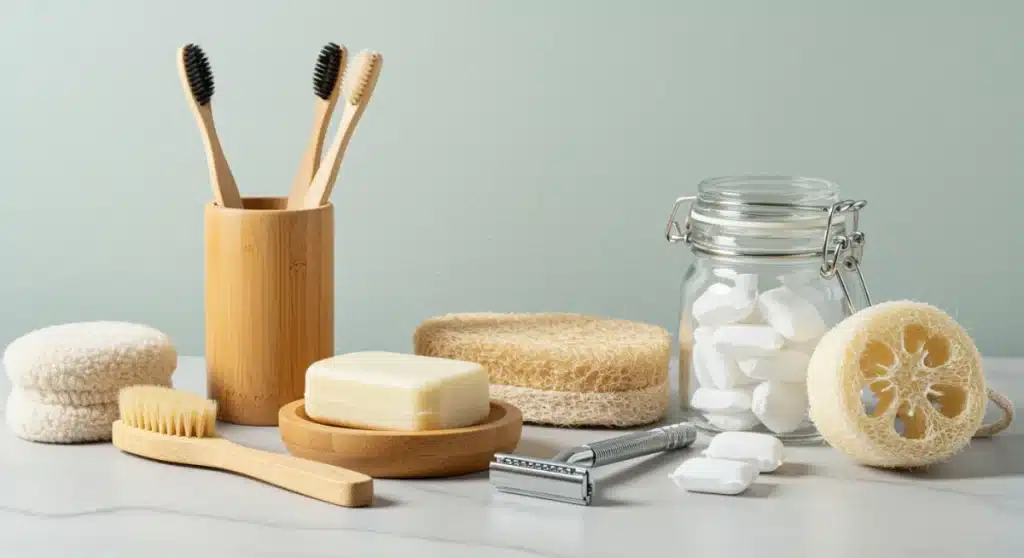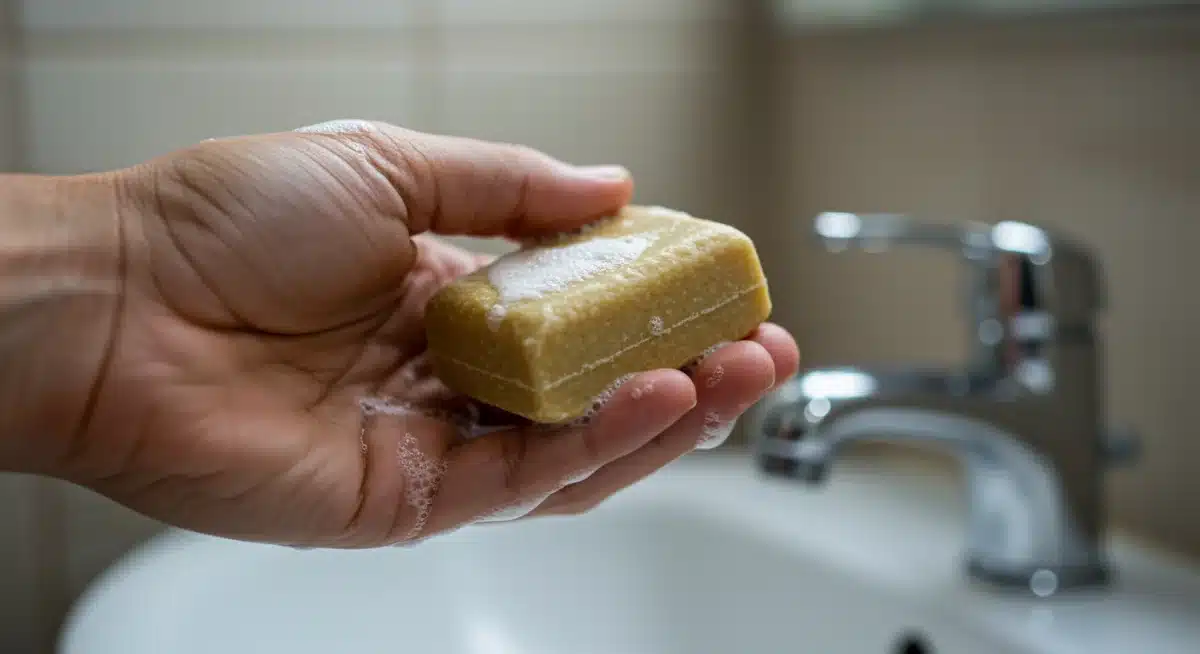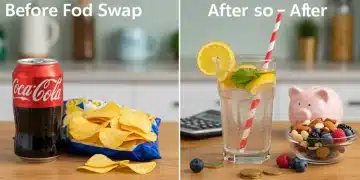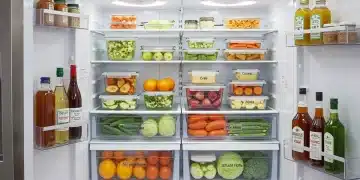Plastic-Free Bathroom: 6 Swaps to Cut Waste by 50%

Implementing 6 essential plastic-free bathroom swaps can reduce household waste by 50% this quarter, offering practical solutions for a more sustainable lifestyle.
As of this week, households are increasingly seeking Practical Solutions: 6 Essential Plastic-Free Swaps for Your Bathroom to Reduce Waste by 50% This Quarter. This immediate shift towards sustainability is driven by a growing awareness of plastic pollution and the tangible benefits of eco-conscious living. Are you ready to transform your bathroom into a waste-reduction zone?
The Urgent Need for Plastic-Free Bathrooms
The global plastic crisis continues to escalate, with bathroom products contributing significantly to single-use plastic waste. Recent reports indicate that an average household discards dozens of plastic items from their bathroom annually, ranging from shampoo bottles to toothpaste tubes. This escalating environmental concern is prompting consumers and manufacturers alike to seek viable, immediate alternatives.
Experts highlight that the bathroom, often overlooked, is a prime area for substantial waste reduction. By making conscious choices, individuals can dramatically decrease their environmental footprint. The emphasis is now on actionable steps that yield measurable results within a short timeframe, such as a single quarter.
Understanding the Environmental Impact
Plastic waste from bathrooms often ends up in landfills or oceans, taking hundreds of years to decompose. This process releases microplastics into ecosystems, affecting wildlife and potentially human health. The urgency to adopt plastic-free solutions is no longer a niche concern but a mainstream imperative.
- Plastic pollution harms marine life and ecosystems.
- Microplastics are entering the food chain.
- Landfills are overflowing with non-biodegradable waste.
- Chemicals from plastics can leach into the environment.
Swap 1: Embrace Solid Shampoo and Conditioner Bars
One of the most impactful changes individuals can make is transitioning to solid shampoo and conditioner bars. These innovative products eliminate the need for bulky plastic bottles, which are notoriously difficult to recycle due to residual product and mixed materials. Solid bars offer a concentrated formula, often lasting longer than their liquid counterparts.
As reported by leading eco-conscious brands, a single shampoo bar can replace up to three plastic bottles of liquid shampoo. This not only reduces plastic waste but also minimizes water usage during manufacturing and transportation, contributing to a lower carbon footprint. Consumers are finding these bars just as effective, if not more so, than traditional bottled products.
Benefits Beyond Waste Reduction
Beyond the obvious environmental advantages, solid bars often contain fewer harsh chemicals, making them gentler on hair and skin. Many are crafted with natural ingredients, aligning with a holistic approach to personal care. The compact nature of these bars also makes them ideal for travel, reducing luggage bulk and preventing leaks.
- Eliminates plastic bottles from landfills.
- Often made with natural, gentle ingredients.
- Concentrated formulas last longer.
- Convenient for travel and storage.
Swap 2: Switch to Bamboo Toothbrushes
The plastic toothbrush is a ubiquitous item, with billions discarded globally each year, ending up in oceans and landfills. A simple yet effective solution is the bamboo toothbrush. Bamboo is a fast-growing, sustainable resource that is biodegradable and compostable, offering a stark contrast to its plastic counterpart.
This swap is gaining significant traction, with surveys indicating a growing preference for eco-friendly dental care. The bristles are often made from plant-based nylon or castor bean oil, further minimizing the environmental impact. Dentists confirm that bamboo toothbrushes are just as effective at maintaining oral hygiene as plastic ones.
The Biodegradable Advantage
Unlike plastic toothbrushes that persist for centuries, bamboo toothbrushes can be composted at the end of their life cycle (after removing the bristles). This closes the loop on waste, returning materials to the earth rather than accumulating in landfills. This small change, multiplied by billions of users, creates a massive positive impact.
- Bamboo is a renewable and sustainable resource.
- Biodegradable handle reduces landfill waste.
- Offers effective oral hygiene.
- Supports eco-conscious manufacturing practices.
Swap 3: Opt for Reusable Safety Razors
Disposable plastic razors contribute substantially to plastic waste, with countless units ending up in trash bins after just a few uses. The reusable safety razor, a classic design, presents a durable and elegant plastic-free alternative. These razors feature a metal handle and replaceable blades, significantly reducing plastic consumption.
While the initial investment for a safety razor can be slightly higher, the long-term cost savings on blades often make them more economical. Moreover, the quality of shave is frequently cited as superior, offering a closer and smoother result with less irritation. This move represents a return to traditional, more sustainable grooming practices.
Long-Term Savings and Superior Shaving
Choosing a safety razor is not just an environmental decision; it’s also a financial one. The blades are inexpensive and widely available, often costing a fraction of cartridge refills. This transition empowers consumers to take control of their grooming habits while making a positive environmental statement.
- Eliminates disposable plastic razor waste.
- Blades are recyclable and inexpensive.
- Offers a close, high-quality shave.
- Durable metal construction lasts for years.
Swap 4: Discover Toothpaste Tablets or Powders
Toothpaste tubes, typically made from a combination of plastic and aluminum, are notoriously difficult to recycle and often end up in landfills. An innovative plastic-free solution is the use of toothpaste tablets or powders. These come in reusable glass jars or compostable pouches, completely eliminating traditional tube waste.
These alternatives work just as effectively as conventional toothpaste, often containing similar active ingredients like fluoride. Simply chew a tablet or moisten your brush with powder, and brush as usual. This swap is particularly effective in reducing waste by 50% in dental care routines, a significant step forward.

Convenience Meets Sustainability
Toothpaste tablets and powders offer a novel approach to oral hygiene. They are mess-free, perfectly portioned, and excellent for travel. This modern solution combines convenience with a strong commitment to environmental responsibility, addressing a major source of bathroom plastic.
- Eliminates non-recyclable toothpaste tubes.
- Packaged in reusable or compostable containers.
- Convenient, pre-portioned, and travel-friendly.
- Effective for maintaining oral health.
Swap 5: Utilize Natural Loofahs or Washcloths
Synthetic sponges and plastic-mesh loofahs are common bathroom items that contribute to plastic waste. These items are often made from petroleum-based plastics and can shed microplastics during use. A straightforward plastic-free alternative is the natural loofah, derived from a plant, or reusable cotton washcloths.
Natural loofahs are biodegradable and compostable, returning to the earth at the end of their lifespan. Cotton washcloths, when made from organic or recycled cotton, offer a reusable and washable option that can last for years. This simple swap significantly reduces plastic waste while providing effective exfoliation and cleaning.
Sustainable Body Care Choices
Choosing natural loofahs or washcloths aligns with a broader movement towards sustainable personal care. These alternatives are not only better for the environment but can also be gentler on the skin, avoiding the harsh textures sometimes found in synthetic products. This change is both practical and beneficial for daily routines.
- Replaces plastic sponges and loofahs.
- Natural loofahs are biodegradable and compostable.
- Washcloths are reusable and reduce waste.
- Gentle and effective for skin care.
Swap 6: Choose Plastic-Free Deodorant and Skincare
Deodorant and skincare products frequently come in plastic containers, adding to the growing problem of bathroom waste. However, an increasing number of brands now offer plastic-free alternatives. These include deodorant sticks in cardboard tubes, cream deodorants in glass jars, and skincare products in refillable or recyclable packaging.
This emerging trend in the beauty industry reflects a strong consumer demand for sustainable options. Many plastic-free deodorants and skincare items are also formulated with natural ingredients, avoiding harsh chemicals often found in conventional products. This swap represents a comprehensive approach to reducing bathroom plastic waste.
Expanding Eco-Conscious Personal Care
The availability of plastic-free deodorants and skincare demonstrates the industry’s response to environmental concerns. Consumers now have a wider array of choices that align with their values, allowing them to maintain their personal care routines without compromising their commitment to sustainability. This category is rapidly expanding with innovative solutions.
- Eliminates plastic packaging from deodorants and skincare.
- Available in cardboard, glass, or refillable options.
- Often feature natural and organic ingredients.
- Supports brands committed to sustainability.
| Key Plastic-Free Swap | Brief Description of Impact |
|---|---|
| Solid Shampoo/Conditioner Bars | Eliminates plastic bottles, often lasts longer, reduces transport emissions. |
| Bamboo Toothbrushes | Biodegradable handle replaces plastic, significantly cuts landfill waste. |
| Reusable Safety Razors | Replaces disposable plastic razors, offers durable, cost-effective shaving. |
| Toothpaste Tablets/Powders | Eliminates non-recyclable toothpaste tubes, packaged in eco-friendly containers. |
Frequently Asked Questions About Plastic-Free Swaps
Yes, many plastic-free alternatives, such as solid shampoo bars and toothpaste tablets, are formulated to be just as effective as their conventional counterparts. Often, they contain high-quality, concentrated ingredients that deliver comparable or even superior results for personal hygiene and care.
To maximize waste reduction, choose products in truly compostable, recyclable, or reusable packaging. Focus on items that eliminate single-use plastics entirely. Also, consider the product’s lifespan and the environmental impact of its ingredients and manufacturing process for a holistic approach.
While some initial investments, like a safety razor, might be higher, many plastic-free alternatives prove more cost-effective in the long run. Solid bars often last longer than liquids, and reusable items eliminate recurring purchases of disposable products, leading to overall savings over time.
Plastic-free bathroom products are increasingly available in organic stores, specialized eco-friendly shops, and major online retailers. Look for certifications that guarantee sustainability and check product reviews to ensure quality and effectiveness. Local zero-waste shops are also excellent resources.
Many experts suggest starting with a bamboo toothbrush or solid shampoo bar as they are straightforward transitions. These swaps immediately eliminate common plastic items from your routine, providing a visible and impactful start to your journey toward a plastic-free bathroom and a more sustainable lifestyle.
Looking Ahead
The movement towards plastic-free bathroom swaps is not a fleeting trend but a fundamental shift in consumer behavior and industry practices. As more individuals adopt these practical solutions, the collective impact on waste reduction will become increasingly significant. We anticipate continued innovation in sustainable product development and broader availability of eco-friendly options. Watch for new policies and corporate commitments that further support this transition, as the drive to mitigate plastic pollution gains unstoppable momentum globally.





